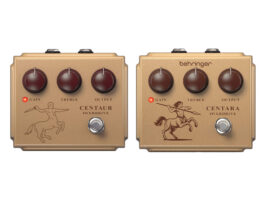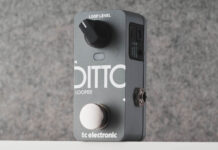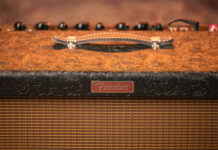
Behringer changes name and artwork of its “counterfeit” Klon clone after legal filing
Behringer appears to have changed the name and artwork of its Klon Centaur overdrive pedal clone, following a recent legal filing from Bill Finnegan, creator of the original Klon Centaur.
Finnegan recently filed a lawsuit against Behringer’s parent company Music Tribe with the Massachusetts federal court following the release of its $69 Centaur Overdrive. Finnegan called the pedal a “blatant counterfeit” of his original Centaur.
READ MORE: The inventor of the Klon Centaur is suing Behringer over its $69 clone – now owners are listing them for up to $2,000
Now, the Behringer website – along with product pages on several online retailers – show the newly refinished pedal, now sporting the name “Centara” instead of “Centaur”, and featuring an updated version of the cartoon centaur on the front, now holding a different pose than the centaur on the original Klon Centaur.
Crucially, the updated pedal now features Behringer’s logo on its front face where the first Behringer Centaur did not. This is important because trademark laws, in large part, are set up so that consumers are not misled into unknowingly buying an inauthentic product.
In his lawsuit against Behringer, Finnegan noted that “consumers expressed extensive actual confusion… with many rushing to purchase Defendants’ counterfeit pedal believing Defendants are delivering on a mass scale a discounted product licensed or endorsed by Plaintiffs”. By now putting its logo front and center, Behringer hopes to squash these accusations.
Credit: Behringer
It looks to be a somewhat stealthy rebrand, with no press release or official communications from Behringer shared with Guitar.com, and minimal coverage elsewhere online.
While there has been no official update on the original lawsuit against Music Tribe, it does appear that Behringer has at least bowed to Finnegan’s original cease and desist. The case will likely continue as the exact relief offered to Klon LLC is calculated.
For a bit of background on the legalities of guitar pedal clones, it’s not possible – in most cases – to patent the design of an electronic circuit, so designers instead use trademarks to protect their products’ trade dress, effectively the way the product looks.
Bill Finnegan would have seen Behringer’s first Centaur clone as an infringement of the trade dress of his original design, as it used both the same name and centaur logo. Now that the name has been changed and the logo altered, will it be enough for Behringer to avoid further legal challenges.
It’s also worth noting that, at least in the US, trademark laws are essentially written so that if a company doesn’t enforce its trademarks, it makes it much harder to fight trademark infringements – including exact clones and copies – in the future.
This formed the basis of Dean/Armadillo’s defence during its fight with Gibson – it argued that Gibson had taken too long to decide to enforce its trademarks. Despite the fact that Gibson was broadly successful, some of its trademarks might now be cancelled due as the jury ruled Gibson did not defend them strongly enough.
As we’ve said, where this leaves Bill Finnegan’s lawsuit against Behringer is unconfirmed, but stay tuned to Guitar.com for future developments.
Learn more about the Centara at Behringer.
The post Behringer changes name and artwork of its “counterfeit” Klon clone after legal filing appeared first on Guitar.com | All Things Guitar.
Source: www.guitar-bass.net












